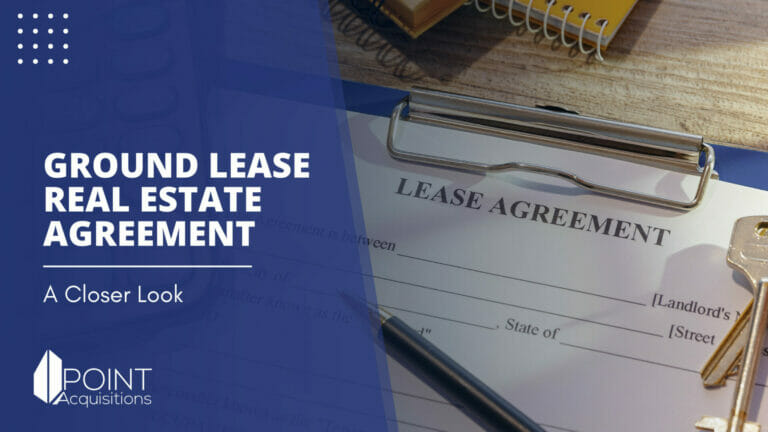
Ground Lease Real Estate Agreement Explained
What is a ground lease in commercial real estate? A ground lease is a real estate term that is often misunderstood. In its simplest form, a ground lease is an agreement between the landlord and tenant in which the tenant leases the land from the landlord for a specific lease period, a ground lease is usually between 50 and 99 years, or more. The lease agreement will spell out the tenant’s rights and obligations, as well as the landlord’s.
A ground lease in commercial real estate is a specialized lease agreement where a tenant rents the land from a landlord but owns any buildings or structures they construct on it. This type of lease typically extends for long periods, ranging from 50 to 99 years, allowing businesses to develop and use the property extensively while not owning the land outright. Ground leases are great for both tenants and landlords, offering a unique investment opportunity and operational platform for businesses, alongside stable, long-term income for landowners.
Ground leases are beneficial for commercial real estate investors due to their potential for high returns on investment, lower risk compared to single-family homes, and the opportunity to diversify an investment portfolio. For tenants, these leases provide control over property development and stability, while landlords benefit from steady rental income and tax advantages without selling the land. However, ground leases also present challenges, including potential tenant default risks for landlords and significant tenant responsibilities for property development and maintenance. Careful negotiation and understanding of the lease terms are crucial for both parties to capitalize on the benefits while mitigating the drawbacks.
Real estate investors cannot overstate the importance of a ground lease, especially in today’s market, where leased land is becoming increasingly rare. We’ll discuss a ground lease and why it is so important for both tenants and landlords.
Table of Contents
What is a Ground Lease?

A ground lease is an agreement where the tenant leases only the land from the property owner. In contrast, the tenant is responsible for developing and maintaining structures or improvements on the leased land.
Essentially, it separates the ownership of the land from the ownership of the buildings on it. Ground leases are typically long-term, spanning several decades, and provide various benefits for both parties involved.
Ground lease vs land lease: A land lease is a lease term in which the lessee (tenant) leases a parcel of land from the lessor (landlord). The lessee has the complete right to use the land for any purpose that is not illegal or harmful to the property. The tenant pays rent to the lessor or property owner in exchange for this right.
Therefore, ground leases stipulate the responsibilities of both the tenant and the property owner. They’re also a common way for commercial buildings businesses to secure the land they need for their operations while avoiding the costs of traditional property ownership.
This type of lease arrangement is common in commercial real estate transactions. It allows businesses to secure the land they need without purchasing it outright.
What are typical ground lease rates? Ground lease rates typically fall within a 7%-9% range, reflecting the current economic and market conditions.
Ground Lease vs. Traditional Lease
Ground leases differ from traditional leases primarily in the scope of the agreement. In a traditional lease, the tenant leases both the land and any existing structures on it. However, in a ground lease, the tenant leases only the land and is responsible for constructing and maintaining any improvements. This key distinction affects the lease agreement’s financial aspects, responsibilities, and ownership structure.
Key Considerations for Ground Lease Agreements
When entering into a ground lease agreement, there are several important factors to consider:
- Market Conditions: Understanding the local real estate market and economic trends is crucial to determine the viability and profitability of a ground lease arrangement.
- Financial Feasibility: Conducting a thorough financial analysis is essential to assess the project’s financial viability and ensure the lease terms align with the expected returns.
- Legal and Tax Implications: Both parties should carefully evaluate Ground leases with legal and tax implications. Seeking professional advice from attorneys and tax experts can help you navigate potential complexities.
Land Lease Agreement: What Does it Mean for Tenants and Landlords?
For tenants, a ground lease is an opportunity to lease land at a fraction of the cost of purchasing it. In addition, a ground lease gives the tenant control over the property. It allows them to make improvements without fear of losing their investment.
On the other hand, a ground lease provides stable and predictable income with minimal risk for landlords. Landlords also have the advantage of leasing their land to multiple tenants, which can help spread the risk among several parties.
Overall, a ground lease is an important real estate term that should be understood by both the landowner and tenants. By understanding the basics of a ground lease agreement, both parties can benefit from this type of lease arrangement.
How The Ground Lease Process Works

The ground lease process usually involves three parties: the property owner, the tenant, and a broker. The landowner will first need to find a tenant interested in leasing their land. Once they have found a tenant, the landowner will work with a broker to negotiate the lease terms. Once the lease is finalized, the tenant will pay rent to the property owner according to the agreed-upon terms.
Under a lease agreement, the tenant is typically responsible for making all improvements to the property. These improvements can include anything from buildings and parking lots to landscaping and fencing. Landlords retain ownership of the land and any improvements made to it and can sell it at the end of the lease term for a profit.
If you are a property owner considering leasing your land, it’s also recommended to consult with a broker to learn more about this type of agreement and whether it would be a good fit for your needs, especially when considering making some land improvements.
Tenant’s Responsibilities Under a Ground Lease

In addition to making all improvements to the property, tenants who enter into ground leases are typically responsible for paying all the property taxes. The landlord is not responsible for any of these expenses, which can add up over time. It is important to factor in taxes when calculating your ground rent payments.
If you are considering entering into a lease arrangement for your commercial property or business, it is important to understand all of the terms and conditions involved.
How Do the Ground Lease Payments Work?

Ground lease payments are typically made on a monthly or yearly basis. They are calculated as a percentage of the property’s value. The amount of rent charged depends on several factors, including the property’s location and the lease term’s length.
Types of Ground Leases: Subordinated Ground Lease & Unsubordinated Ground Lease
Ground leases are often divided into two categories, depending on what happens if the tenant has financial difficulties during their term. These include subordinated ground leases and unsubordinated ground leases.

Subordinated Ground Lease
Ground leases are a common way for landowners to lease their land to developers. There are many different types of ground leases, but the most common is ground lease subordination.
This is a type of lease in which the developer has first priority to purchase the land if it ever becomes available for sale. This is different from a standard ground lease, which gives the developer second priority. In a subordinated ground lease, the landlord retains the right to sell the property to someone else or develop it themselves, but the developer has the first opportunity to purchase it.
In other words, within this arrangement, the tenant agrees that their leasehold interest will be subordinate to any future mortgages or liens placed on the property by the landlord. This means that if the landlord ever needs to borrow money using the property as collateral, the subordinated ground lease will be secondary to the lender’s interest.
Unsubordinated Ground Lease
An unsubordinated ground lease is less common but does offer some advantages to tenants. In this type of arrangement, the tenant’s rights are not subordinated to any future mortgages or liens placed on the property.
An Unsubordinated Ground Lease can be an attractive option for tenants looking for a long-term lease agreement with few restrictions. Nonetheless, it is necessary to remember that the landlord still owns the property and can ultimately do whatever they want with it. If the tenant ever wants to buy the property, they must negotiate with the landlord directly.
Likewise, unsubordinated ground leases give tenants a bit more security, knowing that their interests come first should anything happen with the commercial property down the line. It’s important to note that unsubordinated ground leases are typically more expensive, as landlords need to be reimbursed for the increased risk they’re taking on.
The Advantages of Ground Leases

There are multiple benefits that property owners and tenants can enjoy from entering into a ground lease agreement.
Advantages of a Ground Lease for Tenants
Tenant Control
Ground leases give tenants control over the property, allowing them to decide about design, construction, and operations.
Stability
Ground leases offer tenants stability and predictability in their monthly rent payments.
Easier Financing
Ground lease agreements are often seen as more favorable by lenders, making it easier for tenants to obtain financing.
Advantages of a Ground Lease for Landlords

Rental Income
Ground leases allow landlords to collect rent on their land while retaining ownership, which is a great way to generate passive income.
Predictable Payments
Landlords know exactly what they will be receiving each month in rent payments, making budgeting easier.
Tax Savings
When landlords sell the property outright to their tenants, they realize the gain. Instead, when executing ground leases, there is no need for reporting any such gains as it would be irrespective of what type of contract one signs with their tenant(s). However, tax implications may still arise regarding how much rent they have received in relation to income generated from that source alone.
Easier Financing
Ground land leases agreements are often seen as more favorable by lenders, making it easier for tenants to obtain financing.
With that being said, if you’re considering agreeing to a land lease, as a landlord or tenant be sure to consult with an experienced real estate attorney to ensure that you understand all of the terms and conditions. With so many benefits, it’s no wonder why ground leases are becoming increasingly popular among commercial property owners and tenants alike!
In summary:
| Advantages of Ground Lease for Tenants | Advantages of Ground Lease for Landlords |
|---|---|
| Tenant Control | Rental Income |
| Stability | Predictable Payments |
| Easier Financing | Tax Savings |
| Easier Financing |
Cons of Ground Leases
Cons of Ground Leases for Landlords
While there are many benefits to this type of arrangement, there are also some potential drawbacks that you should be aware of.
Risk of Tenant Default
A risk for landlords when entering into a ground lease is that the tenant may default on their payments. This could leave the landlord responsible for the entire lease payments, which could be difficult to manage if the property is not generating enough income.
Limitations For Selling or Developing a Property

Another potential downside is that ground leases can often be much longer than typical commercial leases, meaning that you could be locked into an agreement for many years, limiting your ability to sell or develop the property in the future.
Cons of Ground Leases for Tenants
All in all, there are cons to consider when entering into a ground lease agreement. Tenants should carefully weigh all the risks and benefits before signing on the dotted line.
Little Control When The Lease Expires
A ground lease expires, which could mean that the tenant’s business is no longer viable.
Not Able to Relocate Easily
The tenant may have invested a great deal of money into their current location and may not be able to relocate easily or at all.
A ground lease can be difficult to understand
Finally, it’s important to remember that ground leases are usually complex legal documents, meaning that it’s essential to have an experienced attorney review the lease before you sign it. They will be able to assist you in drafting a lease agreement that meets your needs and protects your interests. Otherwise, you could be inadvertently agreeing to terms that are not in your best interests.
Is A Ground Lease Good For My Business?
When a business is looking to expand, finding the right property can be a daunting task. There are many things to consider – such as size, location, and zoning. One important thing that often gets overlooked is negotiating a ground lease. Having a solid grasp of the terms involved is crucial for achieving a financeable ground lease negotiation. Seeking the assistance of legal counsel who possess expertise in negotiating ground leases can prove to be a valuable asset for all parties involved in a commercial ground lease transaction.
There are a few different types of commercial leases that business owners should be aware of. One such lease is the ground lease.
Ground lease vs. NNN ground lease
A commerical ground lease is a type of triple-net lease, which means the tenant is responsible for all management duties and costs associated with the property. This can include things like real estate taxes, snow-plowing, parking lot maintenance, new roofing, and more.
A commercial ground lease can provide businesses with much-needed flexibility. A ground lease example: if business conditions change or the company decides to move its operations, it can do so without having to purchase or sell the property. In addition, a ground lease can be negotiated to allow both property owners and developers to achieve their financial and business goals.
The Takeaway
Given these points, a ground lease can provide the best value to the landlord, tenant, and lender for the right client. By understanding the risk and benefits, as well as the typical party’s motivations, an attorney working on a ground lease can best prepare his client for the unlikely eventualities that may face a party to a ground lease – whether they come in the first year or the ninety-ninth.
Frequently Asked Questions (FAQs)
What is the difference between a ground lease and a traditional lease?
A ground lease differs from a traditional lease in that it only involves leasing the land, while a traditional lease includes both land and any existing structures.
How long do ground leases typically last?
Ground leases can span several decades, with durations ranging from 30 to 99 years.
Can a ground lease be renewed?
Yes, ground leases can be renewed, but the terms and conditions must be negotiated between the landowner and the tenant.
What are the tax implications of a ground lease?
Ground leases have significant tax implications, and it’s essential to consult with tax professionals to understand the specific tax laws and regulations in your jurisdiction.
How are rent payments determined in a ground lease?
Rent payments in a ground lease can be fixed, percentage-based, or a combination of both, depending on the terms agreed upon by the parties involved.
About The Author

Jesse Shemesh
Disclaimer
Please note that Point Acquisitions is not a tax expert or tax advisor. The information on our blogs and pages is for general informational purposes only and should not be relied upon as legal, tax, or accounting advice. Any information provided does not constitute professional advice or create an attorney-client or any other professional relationship. We recommend that you consult with your tax advisor or seek professional advice before making any decisions based on the information provided on our blogs and pages. Point Acquisitions is not responsible for any actions taken based on the information provided on our blogs and pages.
1031 Exchange Capital Gains Tax Deferral
According to a 2021 report by the National Real Estate Exchange Services (RES), over 240,000 1031 exchange transactions were completed in the United States, totaling $100 billion. This impressive figure underscores the role of 1031 exchanges in the real estate…
Read More1031 Exchange Benefits
As of Q4 2023, the national vacancy rate for all commercial property types in the United States sat at 9.2%, according to CBRE’s latest insights and research. This represents a slight decrease compared to the previous quarter and suggests a…
Read MoreUnderstanding Commercial Property Value
The art of commercial real estate valuation is a critical skill in an industry teeming with over $1 trillion in yearly transactions. Our detailed guide on how to value commercial property is designed to elevate your expertise and give you…
Read More

